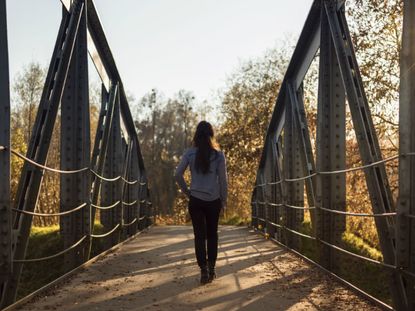We Need To Talk About The Way Police Treat Rape Victims
The head of the MET police has revealed he wants police to stop 'automatically' believing rape victims - but the impact this has could be disastrous on women...

The head of the MET police has revealed he wants police to stop 'automatically' believing rape victims - but the impact this has could be disastrous on women...
11 adults in the UK are raped every hour.
Only 15 per cent of them ever report their assault to the police. Only 5.7 per cent of those charges end in a conviction.
The Head of the Metropolitan Police - Sir Bernard Hogan-Howe - has revealed he's supporting plans to rethink officers' approach to rape.
'Hurrah!' We hear you cry. 'Finally, somebody is going to prioritise the women who have experienced sexual assault - to raise conviction rates, and ensure that all women who experience rape have a safe space to talk about what happened to them, without ever being made to feel that they were at fault. Finally, people like Sara*, who told us about her experiences of reporting rape in London, will get the justice they deserve.'
Except, that's not what Hogan-Howe is suggesting.
He wants police officers to stop 'automatically' believing rape victims - and to treat each case with 'an open mind'.
Marie Claire Newsletter
Celebrity news, beauty, fashion advice, and fascinating features, delivered straight to your inbox!
At first glance, it's a tricky one. After all, what other crimes are there where the victim is 'automatically' believed?
But then again, what other crimes come with such low conviction rates?
And that's the crux of the matter: in a country where it's thought one in five women will experience sexual assault in her lifetime - that's people like Jodie, who spent years hating her body and blaming herself for an attack that took place when she was on holiday, and women like Pavan, who struggled to get a smear test after she was raped as a teenager, - conviction rates are still horrifyingly low.
We still live in a society that talks about the effect a rape charge will have on a man's career (cough, Ched Evans, cough) and yet doesn't seem to worry about the impact the assault itself has on the victim's life. We talk about how horrible it must be to be wrongly accused of a sex attack and not to be believed when you plead your innocence - and that's true, it must be really, really horrible - but we rarely discuss what it's like to experience an attack and not be believed when you find the strength to ask for help.
11 adults in the UK are raped every hour.
Only 15 per cent of them ever report their assault to the police. Only 5.7 per cent of those charges end in a conviction.
As it stands, police officers may have to 'automatically believe' women who have experienced sexual assaults. But that doesn't mean they don't interrogate the women to such an extent that they're still made to feel like they're at fault. It doesn't mean that they don't ask questions like 'how much had you had to drink?', or 'what were you wearing?'.
It just means that they have to take the claims seriously, and launch an investigation.
The reason the 'automatic belief' policy was first introduced was because a serial rapist - who attacked 100 women - remained on the loose after detectives refused to believe women's claims that a black cab driver could be a rapist.
Since then, conviction rates have increased - but as it stands, only 5.7 per cent of reported rapes end in a conviction.
Just to reiterate:
11 adults in the UK are raped every hour.
Only 15 per cent of them ever report their assault to the police. Only 5.7 per cent of those charges in a conviction.
One of the main reasons why Hogan-Howe believes this now needs to stop is because of the 'historic sex abuse' charges which have recently been brought against several men in the limelight, and seen several women coming forward to add additional claims of assault once the initial charges are made public.
But he's missing the point that when one claim of assault is made public, it can encourage other women who have also experienced similar crimes - whether or not by the same man - to come forward too. In some of the historic sex assault claims that have hit headlines over recent years, this has seen women open up about experiences that they've felt ashamed of for decades.
And that's what needs to be our priority.
The leading destination for fashion, beauty, shopping and finger-on-the-pulse views on the latest issues. Marie Claire's travel content helps you delight in discovering new destinations around the globe, offering a unique – and sometimes unchartered – travel experience. From new hotel openings to the destinations tipped to take over our travel calendars, this iconic name has it covered.
-
 Sol De Janeiro now does suncream and they're the best smelling sunscreens I have ever used - I can guarantee they’ll sell out fast
Sol De Janeiro now does suncream and they're the best smelling sunscreens I have ever used - I can guarantee they’ll sell out fastLightweight, non-greasy and delicious smelling
By Valeza Bakolli
-
 I have pale skin and can confirm that these are the very best lipsticks to compliment a fair complexion
I have pale skin and can confirm that these are the very best lipsticks to compliment a fair complexionTo perfectly complement your skin tone
By Mica Ricketts
-
 It's official: these are the 7 Pilates workouts that coaches actually do at home for effective sessions
It's official: these are the 7 Pilates workouts that coaches actually do at home for effective sessionsRoll out those mats and get ready to work.
By Anna Bartter